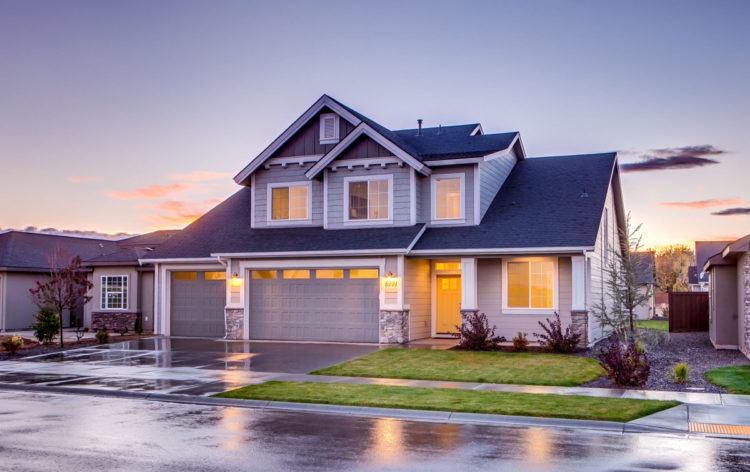Persimmon Shares Rise by 7%, as Company Reconsiders Final Dividend Payment

During the Thursday trading session on the London stock exchange, the Persimmon PLC shares have jumped by 7%. The stock previously closed at 2,433p. However, after today’s surge, the shares have reached 2,607p.
This move came right after the company management announced that during the second half of the year, they would re-evaluate the possibility of paying a final dividend to its shareholders by December 31, 2020. This was stated in the latest trading update, which the firm released today.
The Chief Executive Officer of the company, Dave Jenkinson stated: ”We enter the second half in a strong position, with work in progress well advanced, forward sales 15% ahead year on year, and cash holdings of c. £830m. Our financial strength and the agility of the business in responding to Covid-19 has ensured Persimmon is
in robust health, and fully able to play its part in delivering the new homes the country needs to support the UK’s recovery, in a range of future economic scenarios.”
Recent Financial Situation of Persimmon PLC
It goes without saying that the outbreak of the pandemic had a very negative effect on the business. As the recent trading update states, the revenue has dropped from £1,750 million during the first half of the previous year, to £1,190 million during the first 6 months of 2020. During the same period, due to understandable reasons, the new home completions also fell from 7,584 to 2,900.
Despite those setbacks, the firm did manage to get 1,900 home reservations, through the online channels during the lockdown period. As the company offices opened during the middle of May, on average the firm had 278 net reservations per week. Surprisingly, this number was 30% higher than during the same period back in 2019. So it seems that despite the enormous loss of revenue after the outbreak of the virus, the firm is well-positioned to regain its lost income and also restore its long term profitability.
One of the positive developments was the fact that according to the report during this period the average selling price of homes has reached £225,050. This was approximately 3.7% higher than a year ago when this number stood at £216,942. This suggests that the recent economic downturn so far has not had a very noticeable impact on the UK real estate market. Therefore, those positive trends in real estate prices can certainly support the company revenues and even help to improve its profitability.
This improving financial situation led the management to reconsider their position on paying payouts to shareholders. The final dividend for the year, at a rate of 110p per share, was originally scheduled to be paid on July 6, 2020. However, because of the enormous challenges of the COVID-19, the board decided to postpone this payment.
Obviously, the restoration of the dividend payments will certainly bring some monetary benefits to the company shareholders. However, this decision also signals increasing confidence in the business by the firm’s management. Those developments attracted some new buyers into the company stock and hence the recent appreciation of the price.
Price Action and Current Stock Price Valuations

source: cnbc.com
As we can see from the image above, a year ago, the shares were trading just below the 2,000p level. After the initial pullback in August 2019, the stock began its long uptrend. During the subsequent months, the shares made some steady gains and even reached a peak of 3,298p in the middle of February 2020.
However, despite those impressive gains, the stock fell victim to the March 2020 stock market crash. As a consequence, just within 4 weeks of trading, the stock dropped all the way down to 1,535p. This means that in such a short period of time, the shares lost more than 53% of their value, wiping out a huge portion of the market capitalization of the company.
Despite this devastating blow to the firm’s shareholders, the stock started to recover. As a result of steady appreciation, the shares regained some of their losses and reached a 2,607p level by the beginning of July 2020.
According to CNBC, the earnings per share indicator of the company is 266.78p. This means that the price to earnings ratio of the stock is around 9.77. This suggests that despite the recent sharp appreciation, the shares are still considerably undervalued. Consequently, Persimmon shares are still well-positioned to make further gains and at some point in the future event return to February 2020 highs.
As mentioned earlier, the annual dividend of the company is 110p per share. Therefore, the stock has a dividend yield of 4.2%. This can be a very appealing rate of return for income investors. As the Bank of England interest rates are still at 0.1% and the US Federal Reserve keeps rates within 0% to 0.25% range, people are looking for decent returns for their capital. Therefore, securities, like Persimmon stock can fulfill this role.
The only source of concern here is the fact that the actual payment of dividend in December 2020, is not yet set in stone. According to the recent trading update, the issue is still under consideration. The fact the management deemed it proper to discuss this in an official statement, does mean that it is likely that the dividend will be paid. However, here it is worth noting that at the moment it is still far from guaranteed.
On balance, one can say that this stock might be a worthwhile investment for growth investors. As for income investing, the 4.2% yield seems quite attractive and market participants with relatively higher risk tolerance might consider adding this stock to the portfolio. However, for more risk-averse investors, there are plenty of other options. After all, there are still dozens of firms, which never stopped paying dividends, even during the height of the pandemic outbreak.


























Comments (0 comment(s))